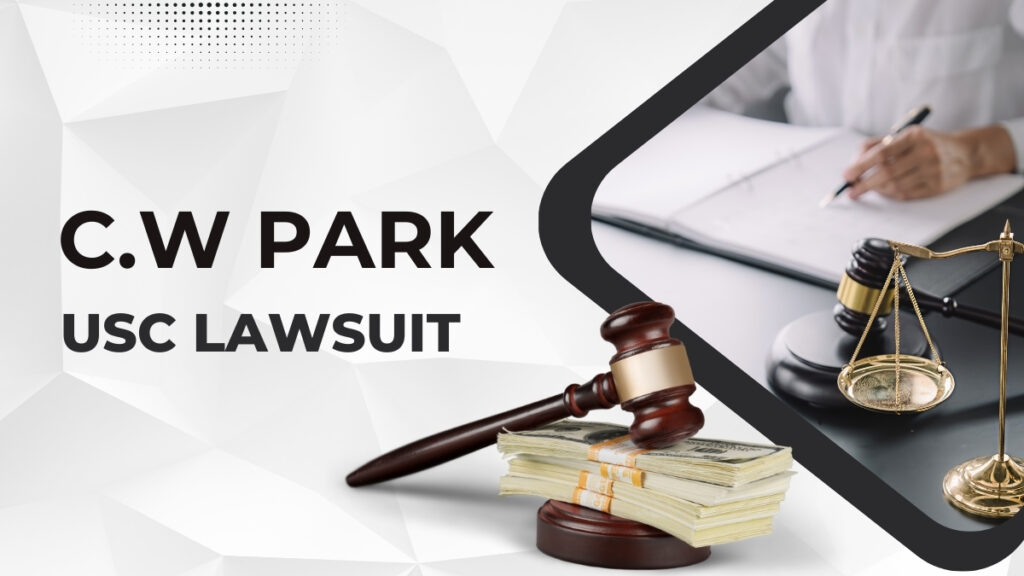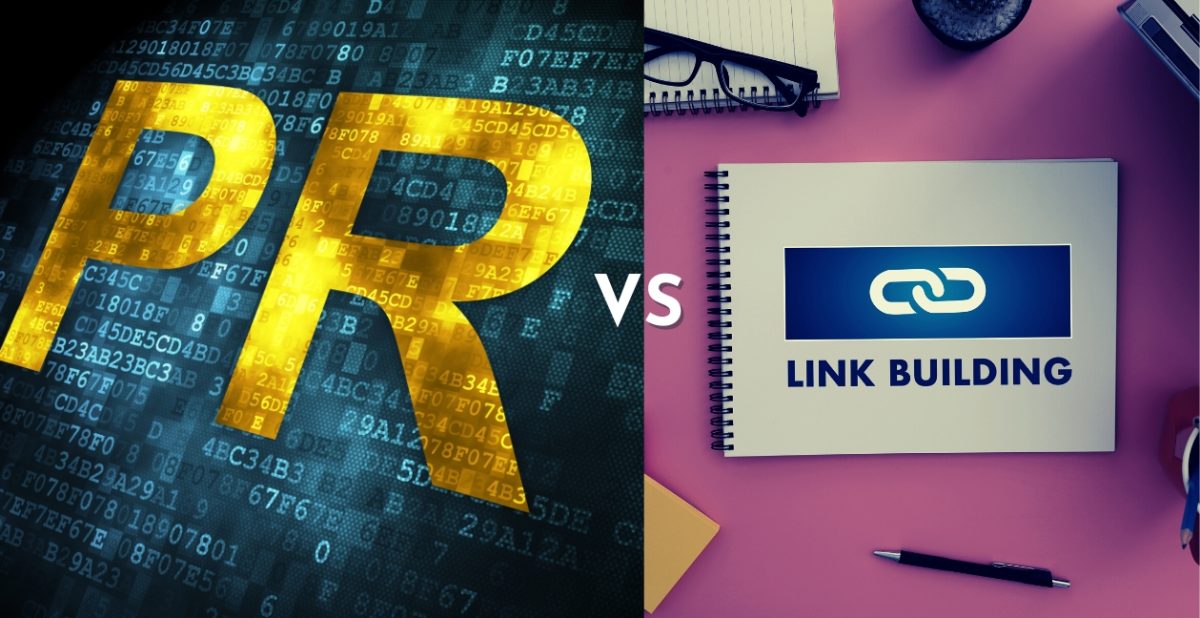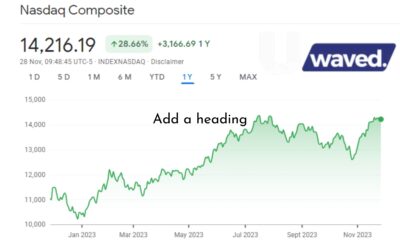Business
Revealing the Intricacies of the C.W. Park USC Lawsuit

Introduction to the C.W. Park USC Lawsuit
Step into the captivating world of controversy and legal battles as we delve into the intriguing saga known as the C.W. Park USC Lawsuit! Brace yourself for a rollercoaster ride filled with allegations, revelations, and an uncertain future for one of America’s most prestigious higher education institutions. In this blog post, we’ll peel back the layers of this high-profile case, exploring its background, detailing the allegations against USC, uncovering recent developments, and assessing its impact on both reputation and academia as a whole. So buckle up and get ready to unravel the intricacies of the C.W. Park USC Lawsuit like never before!
Background on C.W. Park and USC
C.W. Park is a renowned professor and scholar in the field of marketing, known for his groundbreaking research on consumer behavior. He has been affiliated with the University of Southern California (USC) for many years, where he held a prestigious position as the Vice Dean for Research at the Marshall School of Business.
USC, one of America’s top private research universities, has long been recognized for its academic excellence and diverse student body. With a strong emphasis on innovation and entrepreneurship, USC has produced countless successful graduates who have made significant contributions to various industries.
However, recent events involving C.W. Park have cast a shadow over USC’s reputation. Allegations that Park engaged in unethical conduct related to his research work have raised serious concerns within both the academic community and the public sphere.
The allegations against Park include fabricating data in several published studies, misusing grant funds intended for research purposes, and engaging in inappropriate relationships with students under his supervision – actions that are not only ethically questionable but also potentially damaging to USC’s standing as an institution.
As this lawsuit unfolds, it is essential to recognize that these allegations do not reflect upon all faculty members or students at USC. The university remains committed to upholding its high standards of integrity while conducting a thorough investigation into these claims.
This case serves as a reminder that even esteemed institutions like USC are not immune from potential misconduct or scandal among their staff members. It highlights the importance of maintaining rigorous oversight mechanisms within higher education institutions to ensure ethical practices across all levels.
In conclusion (as requested), it is crucial for universities everywhere to take proactive measures in preventing such incidents from occurring in order to protect their reputation and maintain public trust – ultimately fostering an environment conducive to learning and growth.
Details of the Allegations Against USC
The C.W. Park USC lawsuit has brought to light a series of alarming allegations against the prestigious university. The case revolves around accusations that USC had knowingly and intentionally admitted students who were not academically qualified, but rather were connected to influential individuals through bribes and other illicit means.
According to court documents, it is alleged that a scheme was orchestrated by William “Rick” Singer, a college admissions consultant, in which he facilitated fraudulent SAT and ACT test scores for prospective students. These falsified scores would then be submitted as part of their application to USC, giving them an unfair advantage over other deserving applicants.
Furthermore, it is claimed that Singer worked with athletic coaches at USC to create fictitious athletic profiles for these students, allowing them admission through supposed sports scholarships. In reality, many of these students had no prior experience or skill in the sport they were supposedly recruited for.
The scandal also implicated several high-profile parents who allegedly paid large sums of money to ensure their children’s acceptance into USC. These payments purportedly disguised as donations or charitable contributions aimed at benefiting the university itself.
These shocking revelations have sparked outrage among students and alumni alike. Many feel betrayed by an institution they held in high regard for its academic integrity and reputation. The allegations have tarnished the image of USC as a bastion of higher education excellence.
While these are still unproven allegations at this stage, if found guilty it could have severe consequences for both those involved and the university itself. Not only may there be legal ramifications such as fines and potential jail time for those implicated in the scandal but also significant damage to USC’s standing within academia and society at large.
This case serves as a reminder that even esteemed institutions can fall victim to corruption when proper checks and balances are lacking. It highlights the need for increased transparency in college admissions processes across all universities nationwide.
As investigations continue into this matter, it will be interesting to see how USC addresses the allegations and takes steps to rebuild its reputation
Recent Developments in the Case
1. New Evidence Surfaces: In a surprising turn of events, new evidence has come to light in the C.W. Park USC lawsuit. This evidence, which was previously undisclosed, has raised further questions about the university’s handling of the case and its commitment to addressing allegations of misconduct.
2. Increased Public Scrutiny: As news of the lawsuit spreads, there has been a surge in public scrutiny towards USC and its leadership. Social media platforms are abuzz with discussions about accountability and transparency within higher education institutions.
3. Legal Maneuvering: Both parties involved have been engaged in legal maneuvering as they navigate through this complex case. Lawyers on both sides are working tirelessly to build their arguments and present their respective cases before the court.
4. Impact on Other Institutions: The reverberations from this high-profile lawsuit can be felt throughout academia. It serves as a wake-up call for other universities to reevaluate their own policies and procedures regarding allegations of misconduct or negligence.
5. Student Activism Gains Momentum: Students at USC have mobilized efforts to demand justice for C.W. Park and other survivors who may have experienced similar incidents at the university or elsewhere. Their activism is shedding light on systemic issues that need urgent attention.
6. Ongoing Media Coverage: National and international media outlets continue to closely follow developments in this case, putting pressure on USC to address these allegations promptly and effectively.
The recent developments surrounding the C.W Park USC lawsuit have only added fuel to an already intense firestorm engulfing higher education institutions nationwide.
The story is far from over; it continues evolving with each passing day.
Impact on USC’s Reputation and Future

The C.W. Park USC Lawsuit has undeniably left a lasting impact on the reputation and future of the University of Southern California (USC). The allegations made against USC by Professor C.W. Park have brought to light serious concerns about the university’s handling of diversity, inclusion, and academic freedom.
This lawsuit has undoubtedly tarnished USC’s reputation as a prestigious educational institution. News headlines highlighting the alleged discrimination and retaliation faced by Professor Park have created negative publicity for the university. Prospective students, parents, donors, and faculty members may now question whether USC truly upholds its values of fairness and equal opportunities for all.
Furthermore, this lawsuit could potentially lead to financial implications for USC. Donors may reconsider their contributions if they perceive that their funds are being misused or that there is a lack of transparency within the institution. Additionally, prospective students may be hesitant to enroll at USC if they believe the university does not prioritize diversity and inclusivity.
In terms of its future, this lawsuit serves as a wake-up call for USC to address any systemic issues within its administration and ensure proper protocols are in place to prevent similar situations in the future. It is an opportunity for growth and improvement as an institution committed to providing an inclusive environment where diverse voices are valued.
It is crucial for USC to take immediate action in response to these allegations in order to rebuild trust among all stakeholders involved – students, faculty members, alumni, donors – while also reaffirming its commitment towards fostering diversity and promoting academic freedom within its campus community
Potential Ramifications for Higher Education Institutions
The C.W. Park USC Lawsuit has sent shockwaves throughout the higher education community, raising important questions about accountability and transparency in academic institutions. This high-profile case serves as a wake-up call for all universities to take a hard look at their own practices and policies.
This lawsuit highlights the need for more robust measures to prevent and address instances of misconduct within universities. It is essential that educational institutions have clear protocols in place to handle allegations of wrongdoing, ensuring fair investigations and appropriate consequences when necessary.
The fallout from this lawsuit may result in increased scrutiny from regulatory bodies such as accrediting agencies or government entities. Universities will likely face heightened pressure to demonstrate their commitment to ethical practices and responsible governance.
Furthermore, potential donors or alumni could become hesitant about supporting institutions embroiled in such controversies. Financial support is crucial for universities to thrive, so any loss in funding can have far-reaching implications on research projects, scholarships, faculty recruitment, and overall operations.
Additionally, prospective students may think twice before enrolling at a university tarnished by scandal. Reputation plays a significant role when choosing an institution of higher education; therefore negative publicity can negatively impact enrollment numbers which would directly affect revenue streams.
Lastly but not least importantly are legal ramifications faced by these institutions themselves. The outcome of lawsuits like the C.W Park vs USC sets legal precedents that can influence future cases involving similar issues at other colleges or universities across the country.
It is undeniable that the C.W Park USC Lawsuit has brought attention to critical areas where higher education institutions should improve their systems and procedures. From preventing misconduct to managing public relations crises effectively – these challenges must be addressed head-on if universities aim to maintain trust among stakeholders while continuing their mission of providing quality education.
You Might Also Like: MySCAD: Unlocking the Mysteries
Conclusion: Lessons Learned from the C.W. Park USC Lawsuit
The C.W. Park USC lawsuit has shed light on some crucial lessons that higher education institutions, as well as individuals involved in academia, should take to heart.
First and foremost, it is essential for universities to prioritize integrity and transparency in their operations. The allegations against USC have raised concerns about the potential abuse of power and influence within such institutions. It is imperative for universities to establish robust systems of accountability and ensure that ethical standards are upheld across all levels.
Furthermore, this case highlights the importance of due diligence when it comes to admitting students or hiring faculty members. Universities must thoroughly vet applicants and carefully consider any red flags during the admissions or hiring process. This can help prevent situations where unqualified individuals gain access to educational opportunities or positions they do not deserve.
Additionally, effective communication channels between faculty, administrators, and students are crucial in maintaining a healthy academic environment. Encouraging open dialogue can help identify issues early on and prevent them from escalating into larger problems.
Moreover, this lawsuit serves as a reminder that diversity should be embraced and celebrated within educational institutions. Creating inclusive environments where different perspectives are valued fosters innovation and growth while reducing the risk of bias or discrimination.
This case underscores the need for swift action when allegations arise concerning misconduct or unethical behavior within an institution. Promptly addressing grievances with fairness and impartiality demonstrates commitment towards justice and ensures that no individual is above scrutiny.
C.W. Park USC lawsuit has had far-reaching consequences for both USC’s reputation as well as higher education at large. By learning from these mistakes made by one institution, others can work towards building stronger ethical frameworks that protect the interests of all stakeholders involved – ultimately fostering an environment conducive to genuine learning, growth, equality, integrity, accountability, transparency,and progress within academia
Business
Digital PR and Link Building: What They Are, Differences, Characteristics, and Objectives

In the realm of online marketing, the terms “digital PR” and “link building” are commonly used, representing two important strategies in this field.
Digital PR is a marketing strategy aimed at enhancing the online visibility of a company or brand through managing relationships with digital media, bloggers, influencers, and other online figures. Link building is an SEO (Search Engine Optimization) strategy focused on acquiring high-quality links from other websites to one’s own site. These two strategies often overlap, as obtaining links from authoritative sources can also be an objective of digital PR. For both strategies, platforms like SeoLuxury.com can be used, offering an all-in-one tool to improve search engine rankings. Through the platform, you can find websites to propose your content to or use their expert copywriters for content creation if preferred.
What is Link Building and How to Do It
Link building is an SEO strategy that aims to obtain links from other websites to one’s own site to improve search engine rankings. Inbound links (backlinks) from authoritative and relevant websites can increase the authority of your site and help improve its visibility in search results (the SERP, Search Engine Results Page). The first phase of link building involves finding websites from which you can obtain backlinks. These sites should be relevant to your niche or industry and possess online authority. One of the best ways to obtain backlinks is to create high-quality content, such as informative and interesting guides, articles, infographics, or original studies for the target audience. Track obtained backlinks to ensure they are high quality. Additionally, diversify your link building strategy to maintain natural and credible backlinks in the eyes of search engines. Link building requires time, patience, and a strategic approach, but if done correctly, it can help improve your website’s visibility and search engine rankings in the long term.
Digital PR: What It Is, How It Works, Strategies, and Objectives
Digital PR, short for “Digital Public Relations“, is a marketing strategy that focuses on managing relationships and creating positive online visibility for a company, brand, or individual through the use of digital platforms and social media. The main objective of Digital PR is to build and maintain a strong online reputation and promote brand awareness. It involves managing relationships with digital media, online journalists, bloggers, influencers, and the online public. Digital PR experts aim to establish positive connections with these stakeholders to gain media visibility. Creating interesting, informative, or engaging content, such as press releases, articles, blog posts, videos, and infographics, is fundamental to Digital PR.
Digital PR specialists actively seek opportunities for online media coverage. They send press releases, articles, or contributions to online editors and journalists, hoping they will be published or mentioned in their articles. Digital PR requires constant monitoring of online reputation, meaning the image and perception of the company or brand on the web. Digital PR is essential for building and maintaining a positive online reputation, developing public trust, and improving online visibility.
Business
Exploring the Companies that satisfy sanpo yoshi : Companies Striving for Triple Goodness

Introduction:
In a world where profit often takes precedence, a concept like Sanpo Yoshi emerges as a refreshing paradigm shift. Rooted in Japanese philosophy, Sanpo Yoshi translates to “three-way satisfaction,” emphasizing the harmony and balance between the seller, the buyer, and society. It goes beyond the conventional understanding of business success, advocating for mutual benefit and sustainability. In this comprehensive article, we delve into the essence of Sanpo Yoshi, its principles, and the companies that exemplify its ethos.
Understanding Sanpo Yoshi:
Sanpo Yoshi embodies the holistic approach to business, aiming to benefit not just the company and its customers but also society at large. It encompasses three key stakeholders:
- The Seller:
- The company or the seller must benefit from the transaction, ensuring profitability and sustainability. However, this benefit should not come at the expense of others involved.
- The Buyer:
- Customers should receive value for their money, including quality products or services, fair pricing, and excellent customer service. Their satisfaction is integral to the concept of Sanpo Yoshi.
- Society:
- Beyond the immediate transaction, Sanpo Yoshi considers the broader impact on society. This includes environmental sustainability, social responsibility, and contributions to the community’s well-being.
Principles of companies that satisfy sanpo yoshi:
- Mutual Benefit: Sanpo Yoshi emphasizes win-win situations where all parties involved derive value and satisfaction from the transaction. This principle fosters long-term relationships built on trust and collaboration.
- Sustainable Practices: Companies practicing Sanpo Yoshi prioritize sustainable business practices, minimizing negative environmental impact and ensuring the well-being of future generations.
- Ethical Conduct: Integrity and ethical conduct are fundamental to Sanpo Yoshi. Companies uphold honesty, transparency, and fairness in all their dealings, earning the trust and respect of stakeholders.
- Social Responsibility: Beyond profit-making, Sanpo Yoshi encourages companies to contribute positively to society. This may involve philanthropy, community development initiatives, or ethical sourcing practices.
Companies Embracing Sanpo Yoshi:
- Patagonia:
- Known for its commitment to environmental sustainability, outdoor apparel company Patagonia epitomizes the principles of Sanpo Yoshi. From using recycled materials in its products to donating a portion of its profits to environmental causes, Patagonia prioritizes the well-being of the planet alongside profitability.
- Toms:
- Toms revolutionized the concept of corporate social responsibility with its “One for One” model, where for every pair of shoes sold, a pair is donated to a person in need. This commitment to social impact resonates with the spirit of Sanpo Yoshi, where business success is measured not just in financial terms but also in the positive change it brings to society.
- Interface:
- As a leader in sustainable flooring solutions, Interface exemplifies Sanpo Yoshi through its Mission Zero commitment to eliminate any negative impact the company may have on the environment by 2020. Through innovative product design, waste reduction initiatives, and carbon-neutral operations, Interface demonstrates that profitability and environmental stewardship can go hand in hand.
- Ben & Jerry’s:
- Beyond crafting delicious ice cream flavors, Ben & Jerry’s is renowned for its social activism and commitment to progressive values. From advocating for climate justice to championing fair trade practices, the company aligns its business objectives with broader societal goals, embodying the spirit of Sanpo Yoshi.
Challenges and Opportunities:
While the concept of Sanpo Yoshi offers a compelling framework for businesses to operate ethically and sustainably, it is not without its challenges. Companies may face resistance from shareholders focused solely on short-term profits, logistical hurdles in implementing sustainable practices, and skepticism from consumers wary of greenwashing.
However, the opportunities presented by embracing Sanpo Yoshi are equally significant. Companies that prioritize triple goodness stand to gain a competitive edge by differentiating themselves in the market, attracting socially conscious consumers, and fostering loyalty and trust among stakeholders. Moreover, by aligning business objectives with broader societal goals, companies can contribute to positive social change and leave a lasting legacy beyond financial success.
Conclusion:
In a world increasingly characterized by inequality, environmental degradation, and social unrest, the principles of Sanpo Yoshi offer a beacon of hope and a blueprint for a more equitable and sustainable future. By prioritizing mutual benefit, sustainability, and social responsibility, companies can not only thrive financially but also make a meaningful difference in the world. As consumers, investors, and citizens, we have the power to support and champion businesses that embody the ethos of Sanpo Yoshi, shaping a world where prosperity is shared, and all stakeholders benefit.
YOU MAY ALSO LIKE;How2Invest: A Beginner’s Guide to Financial Success
FAQs:
- What does Sanpo Yoshi mean?
- Sanpo Yoshi is a Japanese concept emphasizing triple goodness—benefit for the seller, the buyer, and society—balancing profit with social responsibility.
- How do companies practice Sanpo Yoshi?
- Companies practice Sanpo Yoshi by prioritizing mutual benefit, sustainability, and social responsibility in their operations and decision-making processes.
- Can Sanpo Yoshi be applied to all industries?
- Yes, Sanpo Yoshi principles can be applied to all industries, as they emphasize ethical conduct, sustainability, and societal contributions, regardless of the sector.
- What are the benefits of embracing Sanpo Yoshi for companies?
- Embracing Sanpo Yoshi can lead to a competitive edge, increased consumer trust and loyalty, and positive societal impact, fostering long-term success and sustainability.
- How can consumers support companies practicing Sanpo Yoshi?
- Consumers can support companies practicing Sanpo Yoshi by choosing their products or services, advocating for ethical business practices, and engaging in responsible consumption.
Business
Understanding the Role of Criminal Background Checks in Modern Employment Strategies

Key Takeaways
- Criminal background checks are central to maintaining a safe and trustworthy work environment.
- Adherence to legal guidelines such as the FCRA and EEOC is essential in background screening.
- Emerging trends in technology and globalization are shaping the future of criminal background checks.
What Are Criminal Background Checks?
A criminal background check is a cornerstone practice for employers aiming to establish a secure workplace and uphold high standards of safety and integrity. Such checks delve deep into a candidate’s past and highlight any criminal records that might raise red flags or pose a potential threat within a corporate context. The primary goal is not only to identify risks preemptively but also to foster a workplace wherein trust is built into the very fabric of the corporate culture. A thorough background assessment can include various levels of investigation, from local misdemeanors to more extensive federal criminal records, providing employers with a comprehensive view of an applicant’s history. The relevance of these background checks extends far beyond merely flagging past criminal behavior. In our information-driven age, a criminal background check may offer insights into one’s character by revealing patterns or behaviors that could potentially align or conflict with a company’s values and expectations. Employers conducting these screenings must walk a tightrope of due diligence, ensuring each check respects privacy rights while protecting the business’s and its stakeholders’ interests. In this balancing act, legal ordinances and guidelines play a pivotal role. Organizations must be fully versed in the stipulations of laws such as the Fair Credit Reporting Act (FCRA) and adhere to the best practices outlined by institutions such as the Equal Employment Opportunity Commission (EEOC). These checks guide employers in respectfully and responsibly exercising their right to vet potential employees, as supported by the legal considerations for employers laid out by government agencies.
The Benefits of Implementing Background Checks for Employers
Security and safety within the workplace stand as paramount concerns for employers. Conducting criminal background checks is a practical approach to addressing these concerns, offering valuable insights that could prevent future incidents that may compromise the well-being and security of personnel and clients. This precautionary practice acts as a filter to flag individuals who may have exhibited behaviors in the past that would deem them unfit for specific roles, especially those that require a high degree of trust and ethical conduct. The hiring process becomes more robust, thus forestalling events that could tarnish the organization’s reputation and disrupt the work environment. Furthermore, the strategic implementation of background checks signals current employees and the public that the organization is committed to operating with integrity and due diligence. This level of transparency and accountability can enhance the company’s profile in the eyes of consumers and prospective, high-quality employees. Additionally, a discreet and ethical approach to criminal background checks can lead to a more inclusive hiring process, as it prompts companies to consider the context and relevance of any findings rather than making swift, potentially discriminatory judgments. Such an approach underscores the value of second chances and can diversify and strengthen the talent within the organization.
Navigating Legal Compliance in Criminal Background Screening
The intersection of background screening with an individual’s privacy rights mandates a careful, meticulous approach guided by clear-cut legal standards. Among the primary regulatory bodies influencing this domain are the Fair Credit Reporting Act (FCRA) and the Equal Employment Opportunity Commission (EEOC). The FCRA imposes specific requirements upon employers, including obtaining the candidate’s consent before conducting a background check, ensuring the accuracy of the information obtained, and following set procedures if the information influences hiring decisions. Employers also must be vigilant about adhering to the EEOC’s guidelines, which aim to prevent discrimination in the workforce. Fulfilling these legal requirements demands rigorous adherence to procedures and access to up-to-date information regarding any changes in the law. Ignorance of the latest amendments or complacency in implementing established practices can render an organization vulnerable to legal repercussions, including costly lawsuits. A strategic approach often involves partnering with reputable external agencies that specialize in conducting background checks with an awareness of current legal peculiarities. By doing so, businesses protect themselves from potential litigation and demonstrate a commitment to ethical business practices.
Addressing Common Misconceptions About Criminal Background Checks
Myths surrounding criminal background checks can pose significant barriers to effective implementation and might deter well-qualified candidates from pursuing opportunities. Among the most prevalent misconceptions is the notion that any criminal history will automatically disqualify a candidate from consideration. Reality paints a more nuanced picture. Employers are increasingly encouraged to evaluate the circumstances and relevance of the record to the job in question. This allows for holistic decision-making that factors in rehabilitation, the nature of the offense, and the time elapsed since the incident. Additionally, privacy concerns are often voiced. A properly conducted background check should always be carried out with the full consent and awareness of the individual in question, thus safeguarding their privacy rights. Beyond this, employers are responsible for carefully handling sensitive information, ensuring it is used solely for hiring decisions. By adopting a transparent approach and respectfully addressing potential negative findings, employers can maintain a fair hiring process that respects the dignity of all applicants.
Integrating Background Checks with Broader Hiring Strategies
Criminal background checks should seamlessly integrate within a broader, strategic hiring framework for maximum efficacy. This means they are just one part of a suite of tools for evaluating candidates, including interviews, skill assessments, and reference checks. Employers can enhance their hiring methodologies by ensuring that background checks are not isolated assessments but complement a comprehensive evaluation process.
Communication about background check policies should be clear and consistent from the onset of the hiring process. Prospective candidates should be fully informed of what the checks entail and how the results could affect their employment opportunities. Transparent communication fosters trust and openness, contributing to a higher degree of engagement and confidence among job applicants. This transparency extends to technology executing background checks, allowing for a more streamlined and efficient process that candidates can easily navigate.
The Candidate Perspective: Preparing for a Criminal Background Check
From a candidate’s viewpoint, the prospect of undergoing a criminal background check can be intimidating, especially for those with records they fear may impede their job prospects. Understanding their rights under the FCRA and preparing for the process can alleviate some of this apprehension. The key is that candidates know they have the right to be informed about the background check, consent to it, and dispute any inaccuracies that arise. They should also be coached on articulating context around adverse findings, providing clarity, and mitigating concerns from potential employers. Equipping candidates to handle this step can result in a more open, positive recruitment process.
Ethical Considerations in Criminal Background Checks
While ensuring the safety and security of a workplace, employers must wrestle with the ethical dimensions of conducting background checks. Respecting applicants’ privacy and handling their personal information with integrity is paramount. Employers must balance the need for thorough vetting and honoring the respect and dignity owed to every candidate. A transparent and considerate approach, where candidates know what to expect and the information is used conscientiously and fairly, can help surmount these ethical challenges.
The Future of Criminal Background Checks
The realm of background checks is poised on the cusp of significant change, spurred by technological advancements like artificial intelligence (AI) and machine learning. These technologies introduce new levels of accuracy and efficiency into the screening process, reducing human error and potentially speeding up hiring timelines. As these tools evolve, continuous vigilance on their ethical implementation and regulation compliance will become crucial for employers. Updating policies to accommodate these innovations while maintaining a human-centered approach in the hiring process will be critical to their successful integration.
Conclusion: Building a Safer, More Trustworthy Workforce
In conclusion, the efficacy of criminal background checks arises from their ability to offer deeper insights into the potential risks associated with hiring individuals with specific backgrounds. When executed with legal diligence and ethical consideration, these checks are potent tools for building safer, more trustworthy teams. The landscape for background screening is ever-evolving, demanding adaptability and continuous learning from today’s employers. Organizations committed to these principles will find themselves well-equipped to enhance their hiring processes, secure their environments, and foster the growth of an integrity-driven workforce.
-

 Technology5 months ago
Technology5 months agoBoosting Customer Engagement Through App Loyalty Programs
-

 Technology7 months ago
Technology7 months agoGeekzilla Podcast: A Remarkable Journey into Geek Culture
-

 Blog6 months ago
Blog6 months agoMaterialistic Princess Spoilers Complete Story 2024
-

 Business6 months ago
Business6 months agoIndexnasdaq: .ixic: Latest Quotes, Charts, and Insights 2024
-

 Technology7 months ago
Technology7 months agoAiyifan: All You Need To Know About It
-

 Technology6 months ago
Technology6 months agoConcept of Coomersu: A Comprehensive Guide
-

 General4 months ago
General4 months agoExploring the Intricacies of Käämyäjä: A Step-by-Step Guide-2024
-

 Technology6 months ago
Technology6 months agoBertėjas: A Deep Dive into the World of Language Translation





















